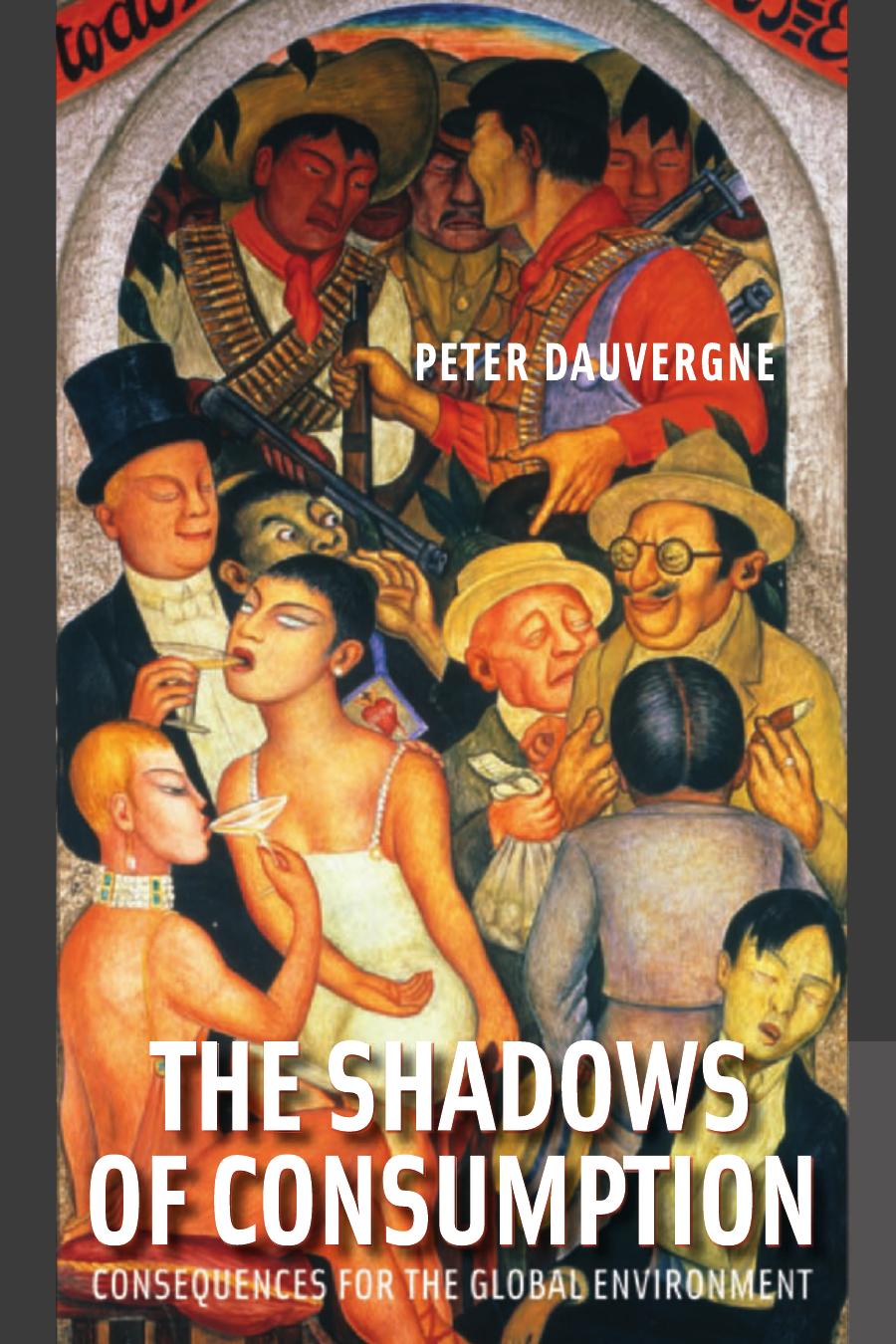The Shadows of Consumption: Consequences for the Global Environment by Peter Dauvergne

Author:Peter Dauvergne [Dauvergne, Peter]
Language: eng
Format: epub, pdf
Tags: Science, Earth Sciences, General, Environmental Science, The MIT Press
ISBN: 9780262042468
Google: RV9_mwEACAAJ
Amazon: 0262514923
Publisher: MIT Press
Published: 2007-12-31T23:00:00+00:00
16
The Ecology of Big Beef
Producing so much beef involves many ecological costs. Farmers are tilling land with pesticides and fertilizers to grow enough grain to fatten cattle quickly. Waste from feedlots is polluting local waterways and air.
Growth hormones are tainting food chains, and antibiotics are flowing through ecosystems. The nutritional value of beef is inconsistent and declining in some places. Ranches and feed crops like soybeans are deforesting biodiversity hotspots like the Amazon. And grazing, fattening, and slaughtering billions of cattle every few years is depleting water supplies and emitting vast quantities of greenhouse gases like methane, nitrous oxide, and carbon dioxide.
These impacts are intensifying as the globalization of beef markets creates opportunities to expand commercial ranching even further.
Plantations for animal feed crops like corn and soybeans are spreading in response. This in turn is contributing to a surplus of cheap vegetable oils, with incentives for firms to get people to consume more, whether as salad or cooking oil, in margarine and processed food, or in bakery shortening. What the health consequences will be is an ongoing experiment.
Much of this growth in industrial ranching and agriculture is occurring in developing countries; the beef and feed grains produced there are then exported primarily to developed or transitional economies. Many of these operations are supported by government subsidies, foreign aid, and by multinational companies, whose “support” is increasing the foreign debt of these developing countries and profiting the multinationals disproportionately. Prices that do not account adequately for the social and environmental costs—most notably, the impacts on water, land, and climate—are also stimulating overconsumption as cheap beef becomes more common in more cultures. This globalization of industrial beef production, this chapter argues, is intensifying the shadow effects of consuming beef, with the costs increasingly deflected into developing countries, the global commons, and people’s future health.
Download
The Shadows of Consumption: Consequences for the Global Environment by Peter Dauvergne.pdf
This site does not store any files on its server. We only index and link to content provided by other sites. Please contact the content providers to delete copyright contents if any and email us, we'll remove relevant links or contents immediately.
Man-made Catastrophes and Risk Information Concealment by Dmitry Chernov & Didier Sornette(5981)
The Revenge of Geography: What the Map Tells Us About Coming Conflicts and the Battle Against Fate by Kaplan Robert D(4062)
Zero Waste Home by Bea Johnson(3821)
COSMOS by Carl Sagan(3604)
Good by S. Walden(3535)
In a Sunburned Country by Bill Bryson(3524)
The Fate of Rome: Climate, Disease, and the End of an Empire (The Princeton History of the Ancient World) by Kyle Harper(3046)
A Wilder Time by William E. Glassley(2846)
Camino Island by John Grisham(2787)
Organic Mushroom Farming and Mycoremediation by Tradd Cotter(2678)
The Ogre by Doug Scott(2667)
Human Dynamics Research in Smart and Connected Communities by Shih-Lung Shaw & Daniel Sui(2489)
Energy Myths and Realities by Vaclav Smil(2478)
The Traveler's Gift by Andy Andrews(2445)
9781803241661-PYTHON FOR ARCGIS PRO by Unknown(2354)
Inside the Middle East by Avi Melamed(2340)
Birds of New Guinea by Pratt Thane K.; Beehler Bruce M.; Anderton John C(2244)
A History of Warfare by John Keegan(2226)
And the Band Played On by Randy Shilts(2179)
